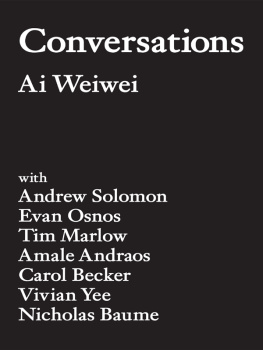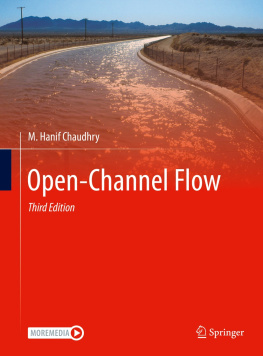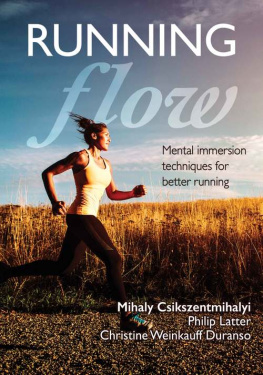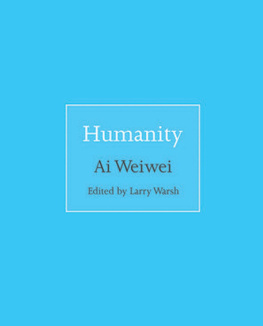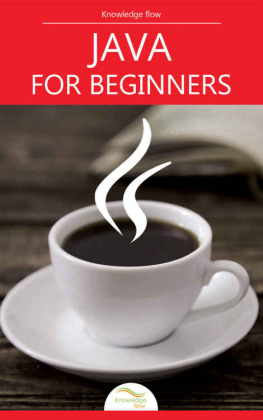Ai Weiwei - Human Flow
Here you can read online Ai Weiwei - Human Flow full text of the book (entire story) in english for free. Download pdf and epub, get meaning, cover and reviews about this ebook. year: 2020, publisher: Princeton University Press, genre: Politics. Description of the work, (preface) as well as reviews are available. Best literature library LitArk.com created for fans of good reading and offers a wide selection of genres:
Romance novel
Science fiction
Adventure
Detective
Science
History
Home and family
Prose
Art
Politics
Computer
Non-fiction
Religion
Business
Children
Humor
Choose a favorite category and find really read worthwhile books. Enjoy immersion in the world of imagination, feel the emotions of the characters or learn something new for yourself, make an fascinating discovery.

Human Flow: summary, description and annotation
We offer to read an annotation, description, summary or preface (depends on what the author of the book "Human Flow" wrote himself). If you haven't found the necessary information about the book — write in the comments, we will try to find it.
Ai Weiwei: author's other books
Who wrote Human Flow? Find out the surname, the name of the author of the book and a list of all author's works by series.
Human Flow — read online for free the complete book (whole text) full work
Below is the text of the book, divided by pages. System saving the place of the last page read, allows you to conveniently read the book "Human Flow" online for free, without having to search again every time where you left off. Put a bookmark, and you can go to the page where you finished reading at any time.
Font size:
Interval:
Bookmark:
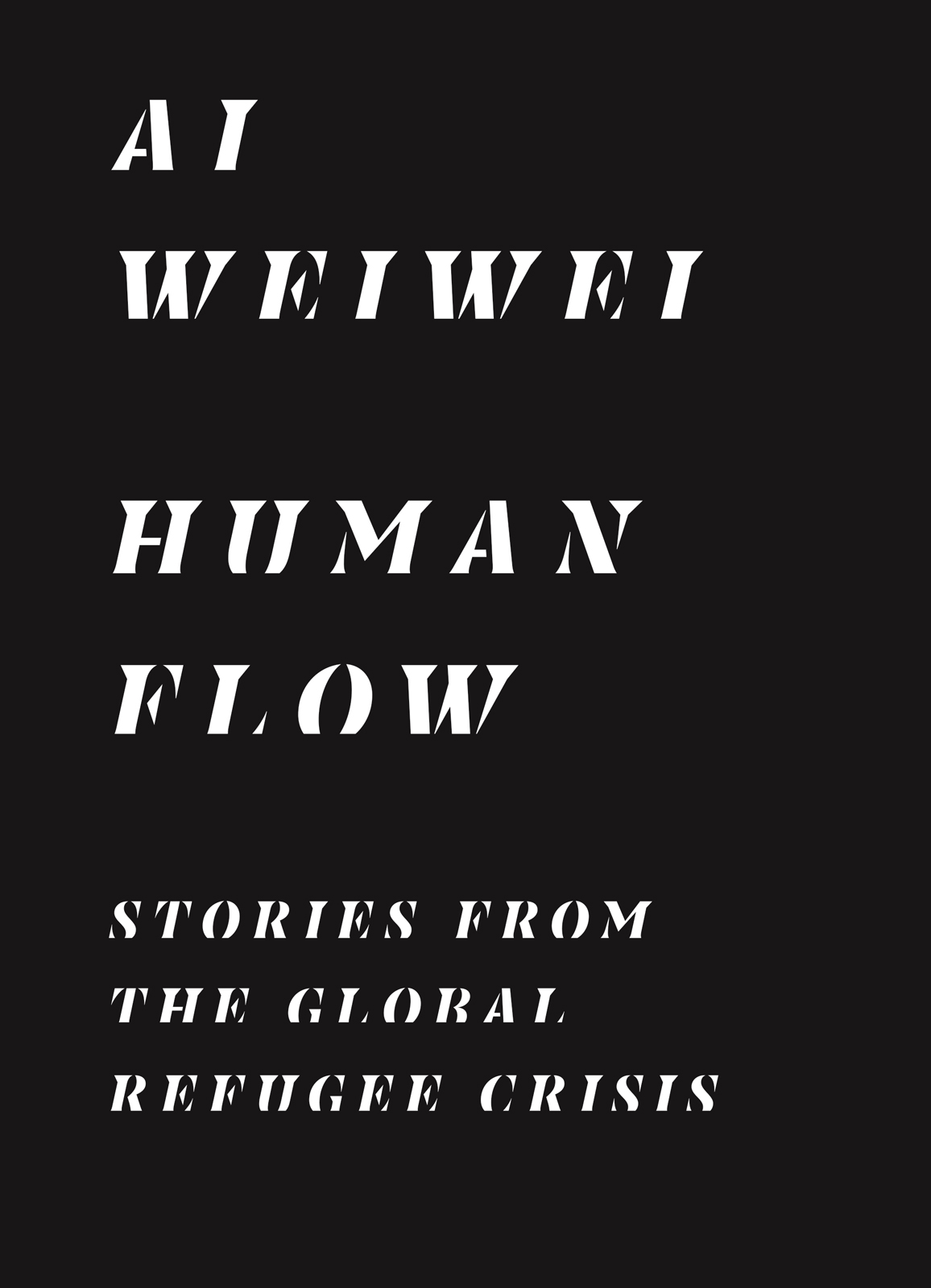
Human Flow: Stories from the Global Refugee Crisis
WEIWEI
FLOW
THE GLOBAL
REFUGEE CRISIS
Editors
Boris Cheshirkov
Ryan Heath
Chin-chin Yap
Princeton University Press
Princeton and Oxford
Copyright 2020 by Ai Weiwei
Published by Princeton University Press, 41 William Street,
Princeton, New Jersey 08540
In the United Kingdom: Princeton University Press,
6 Oxford Street, Woodstock, Oxfordshire OX20 1TR
press.princeton.edu
All Rights Reserved
Library of Congress Cataloging-in-Publication Data
Names: Ai, Weiwei, interviewer. | Cheshirkov, Boris, editor. | Heath, Ryan, 1980- editor. |
Yap, Chin-chin, editor.
Title: Human flow : stories from the global refugee crisis / Ai Weiwei;
editors, Boris Cheshirkov, Ryan Heath, Chin-chin Yap.
Description: Princeton: Princeton University Press, [2020] | Includes index.
Identifiers: LCCN 2020011535 (print) | LCCN 2020011536 (ebook) |
ISBN 9780691207049 (paperback) | ISBN 9780691208060 (ebook)
Version 1.0
Subjects: LCSH: RefugeesInterviews. | RefugeesBiography.
Classification: LCC HV640 .A2226 2020 (print) | LCC HV640 (ebook) |
DDC 362.87092/2dc23
LC record available at https://lccn.loc.gov/2020011535
LC ebook record available at https://lccn.loc.gov/2020011536
British Library Cataloging-in-Publication Data is available
Design: hesign, Berlin
Assistant Editor: Hanno Hauenstein
xi
xiii
Interviews may have been edited and condensed for clarity. Some interviews have been translated from Arabic, Farsi, French, Greek, Kurdish, Malaysian, Rohingya, Spanish, and Turkish into English.
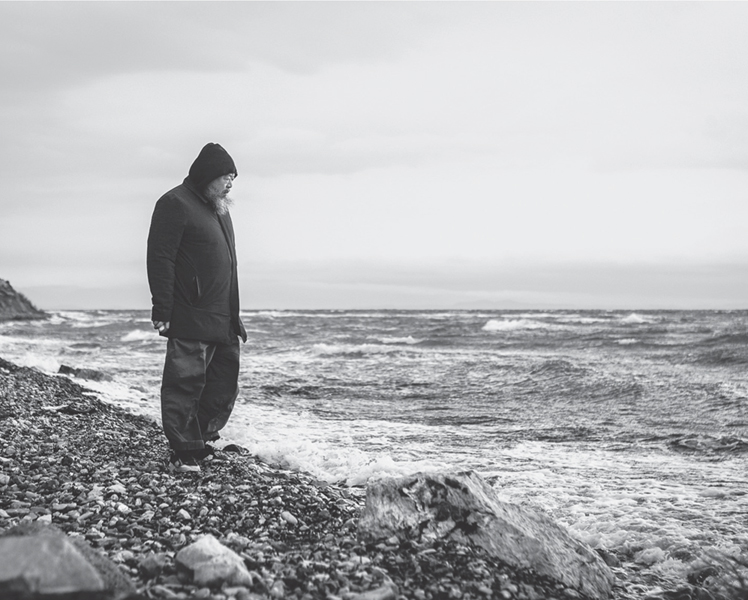
Ai Weiwei, Lesvos, Greece, 2016
The interviews in Human Flow: Stories from the Global Refugee Crisis were conducted as part of the making of Human Flow (2017), my feature documentary on the global refugee crisis.
Human Flow documents the lives of refugees in twenty-three countries: Afghanistan, Bangladesh, France, Germany, Greece, Hungary, Iraq, Israel, Italy, Jordan, Kenya, Lebanon, Macedonia, Malaysia, Mexico, Pakistan, Palestine, Serbia, Sweden, Switzerland, Thailand, Turkey, and the United States. My aim was to portray the history and scale of the refugee crisis around the world. For this project my team interviewed more than 600 refugees, aid workers, doctors, historians, politicians, and local authorities.
Most of the people we approached were receptive to sharing their stories and opinions. A number of politicians declined, and some refugees were afraid of reprisal or endangering their loved ones back home. This selection is the result of our sincere and dedicated effort to provide a portrait of our time.
As an artist, I believe that any individual effort can make a change, which also comes with responsibility. We are grateful that these one hundred voices can be heard, and we hope they will offer insight into the greatest humanitarian crisis of our times.
Ai Weiwei
Berlin, September 2019
Stories from the Global Refugee Crisis
Tempelhof Refugee Camp, Berlin, Germany, 2015-12-16 and 2016-02-09
AW: | Whats the history of this building? |
PT: | It has a difficult history, but its a very special place for me and for many people. Were in the main hall of the former Tempelhof airport, an incredible old structure that ceased functioning as an airport in 2008not a long time agobut, since then, many things have happened. |
The building was constructed in 1938, during Hitlers time. Were in a space full of history, good and bad. When the airport stopped being an airport, nobody really knew what function it would assume. The first thing that happened was that we started hosting events here. We had a big fashion show and some smaller events, which was a good way to open up these spaces to the public, otherwise the building wouldve been closed. You could feel that something special was happening here. | |
Not being German, I always felt Berlin was very different from other German cities. I came here because I knew this place from about thirty years ago. At that time Berlin was still occupied by American, French, and British military forces, and the wall was still there. This airport was run mainly by the US Air Force, so in one half of the building, it was like being in the US and the other half of the building was a normal public airport. My parents were working for the military, so I was able to walk in all these spaces. Of course, if you come to Berlin as a foreigner, you want to know a lot about the city. | |
You probably know how and why the airport was built, what happened with it when the war was over, and how it was used for people coming from East Germany or East Berlin. At that time, the wall wasnt built yet. It was the only way to get to West Germany, an orderly way to get out of the city. | |
I came here because I knew that Berlin was becoming more of a truly international city. I was privileged to work in many huge cities all over the world before coming to Berlin: in South America, the US, the Middle East. Theres still a gap when you compare Berlin to other big cities outside of Europe. When talking about a city in Asia, youre talking about millions of people, but if you talk about a big city in Germany, its still small compared to the megacities in the world. | |
What I saw in all these citiesShanghai, Bangkok, Singapore, Hong Kong, or even Rio de Janeiro, Mumbai, and Moscowwas the challenge of accommodating all these people in adequate spaces. This was the specific reason why I thought Tempelhof could become a special place for Berlin and for Germany. When you have a large, open space like this, you have the possibility of creating new things because you dont have to work within a framework. People can come here and decide what they want to do. They can create the space they want to have. Inside these larger spaces, things can happen that could probably never happen somewhere else. | |
AW: | Whats the current condition of the camp? |
PT: | When I came here the objective was just to rent out spaces that could be used to earn a bit of money to contribute to its huge maintenance cost. We started by sponsoring commercial events. We had about eighty commercial events every year. The number and size increased exponentially. We had huge events that had never before happened in Germany. In the past five to ten years, weve seen more of a mix between commercial and cultural events. We have huge halls hereseven hangars where aircraft were maintained in the past. |
Font size:
Interval:
Bookmark:
Similar books «Human Flow»
Look at similar books to Human Flow. We have selected literature similar in name and meaning in the hope of providing readers with more options to find new, interesting, not yet read works.
Discussion, reviews of the book Human Flow and just readers' own opinions. Leave your comments, write what you think about the work, its meaning or the main characters. Specify what exactly you liked and what you didn't like, and why you think so.

